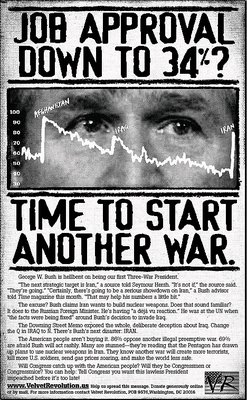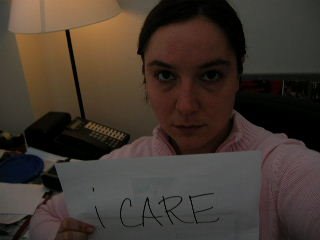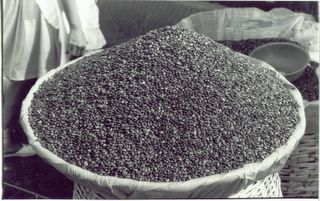Yup, That About Sums It Up
From an Op-Ed in the LA Times by Bill Mahr (not my favorite guy, but...) I'm pretty sickened by the FDA and how it has become overwhelming politicized. First Plan B, then the statement this week on pot. GAWD!!!
Pill popper nation
Drug companies are the pushers, the FDA a cop paid to look the other way.
By Bill Maher, BILL MAHER is the host of HBO's "Real Time with Bill Maher."
April 27, 2006
IF I HAD every problem the TV ads say I do — breathing, lifting, walking, sitting, sleeping and my toes rotting off — I'd welcome death. Al Qaeda? Bring it on. Nerve gas? Please, I've got seasonal allergies.
It seems as if every time I turn on the TV these days, I see some ad for some drug I never heard of to treat some disease I never heard of....
The problem is, the profits are so enormous for magic pills that drug companies invent the pill first and then conjure up something it can treat.
Right now, the Food and Drug Administration is considering a petition from the drug lobby to get rid of the warnings in drug ads. The Coalition for Healthcare Communication — which sounds a lot nicer than "the Pushers Union" — says that alerting people to side effects "over warns" consumers. So forget all that mumbo-jumbo. Who are you going to trust, a lot of small print or a talking bee? Come on, take this pill. It'll make a football go through a tire swing. Side effects? You bleed from your pores, then explode and die. And/or dry mouth.
Just in the last two years, the drugs that have made the headlines under the category "Prescription Medicines That Hurt People" have included Vioxx and Ambien. And yet it was marijuana last week that was declared by the FDA to have no known medical value. Actually, what marijuana has is no known lobbying value.
And yes, back in 1999, when we still believed in science, the National Academy of Sciences' Institute of Medicine said what millions who simply have gotten relief already know: that pot is useful in treating pain, nausea and AIDS-related weight loss, and that lab rats exposed to it were more likely to forget the maze and just kick it old school.
But the FDA, you see, protects us from marijuana. Is there anything more laughable than the thought that the FDA is protecting anything but the profit margins of pharmaceutical companies? And the bribery doesn't stop with the FDA and Congress. Doctors get whisked off to exotic locales for weekend "seminars," all paid for, of course, by drug companies, and suddenly Monday morning everyone needs OxyContin — which in reality is a powerful, morphine-like narcotic meant to be used only by those in severe physical pain and, of course, celebrities.
"Ask your doctor if it's right for you" has become, "Tell your doctor to shut up and fork over the pills."
Drug companies are pushers, and Congress and the FDA are the cop on the beat who's been paid off to look the other way. New drugs used to have to go through a rigorous process of testing. Now they just give it to Courtney Love, and if she lives, it's approved.
By the way, that FDA report about marijuana having no medical value was issued, on purpose I'm sure, on April 20 — 4/20. That joke only makes sense to stoners. So Mom and Dad, if your kid just laughed, you might need to search his room.
















